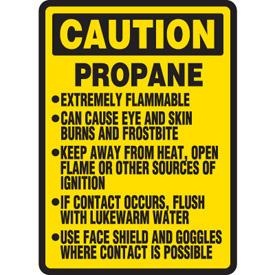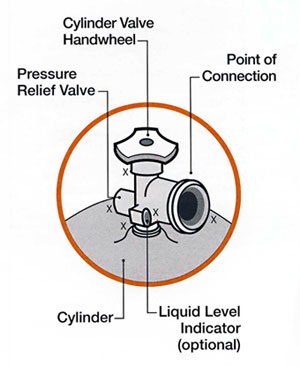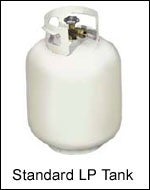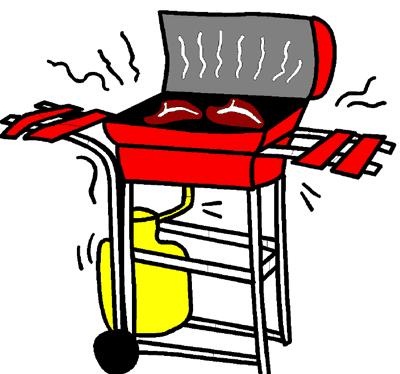Outdoor Grill, Fire Pit & Heater Safety for Gas Grills
Propane is a very safe fuel. But as with any energy source, there are steps you should take to further ensure your safety.
What is Propane?
Propane (also called LPG—liquefied petroleum gas—or LP gas) is a liquid fuel stored under pressure that vaporizes to a gas before it leaves the tank. At normal atmospheric pressure and temperature, it is a non-toxic, colorless and odorless gas. Just like natural gas, an identifying odor is added so it can be readily detected.
Propane is flammable when mixed with air (oxygen) and can be ignited by many sources, including open flames, smoking materials, electrical sparks, and static electricity. Severe freeze burn or frostbite can result if propane liquid comes in contact with your skin.
Safe Grilling Tips
- Read and follow all the grill manufacturer's instructions before turning on and lighting the grill. Keep the top open when lighting a propane grill, and don't close it until you are sure the grill is lit.
- Turn off the burner control and close the cylinder valve. When a grill is not in use for extended periods of time, cover disconnected hose-end fittings with plastic bags or protective caps to keep them clean.
- Properly transport and store gas cylinders. When refilling or replacing a propane cylinder, transport in a secure, upright (vertical) position in a well-ventilated area in your vehicle, and take it home immediately. Always use or store cylinders in a secure and upright position outdoors (not in a garage or shed).

"Dos" and "Don’ts"
DO:
- Follow the grill manufacturer's instructions and keep written materials handy.
- If the ignitor no longer works, replace it in accordance with the grill manufacturer's instructions.
- Keep the top of the grill open until you are sure it is lit, even if you have an electronic ignition.
- Cover disconnected hose-end fittings with plastic bags or protective caps to keep them clean and functional.
- Store propane cylinders outdoors in an upright (vertical) position.
- If you smell gas, and it is safe to do so, turn off the cylinder valve, turning it to the right (clockwise). If you are unable to turn off the valve, immediately leave the area and dial 9-1-1.
- Consult a qualified service technician if you are having grill or propane cylinder problems.
DON'T:
- Smoke while handling a propane cylinder.
- Use matches or lighters to check for propane leaks.
- Pour an accelerant such as lighter fluid or gasoline on the grill.
- Allow children to tamper with the cylinder or grill.
- Use, store, or transport propane cylinders near high temperatures
(this includes storing spare cylinders near the grill). - NEVER use a damaged cylinder or a cylinder that has been in a fire. All cylinders must be inspected before they are refilled. The law requires periodic inspection of cylinders, and it is against the law to refill out-of-date cylinders. The last inspection date is stamped on the cylinder.
Tampering with/repairing Small Cylinders or Outdoor Appliances
DO NOT UNDER ANY CIRCUMSTANCES TRY TO MODIFY OR REPAIR VALVES, REGULATORS, OR OTHER CYLINDER OR APPLIANCE PARTS.
Propane cylinders incorporate special components such as valves, connectors, and other parts to keep them safe for use with grills and other propane appliances. Damage to any component can cause a gas leak.
DON’T RISK IT! Call your propane retailer or a qualified service technician for assistance.

If You Smell Gas
1. Immediately put out all smoking materials and other open flames.
2. If you are able to, safely turn off the cylinder valve. To close the valve, turn it to the right (clockwise).
3. Immediately leave the area and call 9-1-1.
4. Before you restart the appliance, have a qualified service technician inspect your cylinder and appliance.
Learn what propane smells like. Propane smells like rotten eggs, a skunk’s spray, or a dead animal. Propane manufacturers add this smell to help alert customers to propane leaks. IF YOU ARE CONCERNED that you or others in your home may have difficulty smelling propane, consider buying a propane gas detector.
Transporting & Storing Small Cylinders
 ALWAYS transport & store a cylinder in a secure and upright position so it will not fall, shift or roll.
ALWAYS transport & store a cylinder in a secure and upright position so it will not fall, shift or roll.- ALWAYS proceed directly to your destination and immediately remove the cylinder from your vehicle.
- NEVER store or place a propane cylinder indoors or in an enclosed area such as a basement, garage, shed, or tent.
- NEVER place or store a filled cylinder in an area of excessive heat, inside a hot vehicle, or near a stove, fireplace, or other heat source. Exposing cylinders to heat above 120º F may result in a flash fire or explosion.
- NEVER store or place a spare cylinder under or near a barbecue grill.
- DO NOT smoke or have any ignition sources in the area while handling or transporting cylinders.
- ALWAYS close the cylinder valve and, if required, seal with a plug, even if the cylinder is empty.
- The law places limits on the number of cylinders and the amount of propane that can be transported in closed-bodied vehicles such as passenger cars and vans. Ask your propane retailer for more information on State and local codes that apply to you.
Fire Code on Open-flame Cooking Devices
Charcoal burners and other open-flame cooking devices shall not be operated on combustible balconies or within 10 feet (3048 mm) of combustible construction.
Exceptions:
- One- and two-family dwellings
- Where buildings, balconies and decks are protected by an automatic sprinkler system.
- LP-gas cooking devices having LP-gas container with a water capacity not greater than 2 1/2 pounds [nominal 1 pound (0.454 kg) LP-gas capacity].
LP-Gas (Liquified Petroleum Gas)
An operational permit is required for storage and use of LP-gas.
Exception: A permit is not required to use one LP-fueled cooking device per building or to store one additional cylinder with a 20 lb. (9.1 kg) aggregate water capacity outside of the building of residential occupancies. See Section 308.1.4 for additional requirements.
